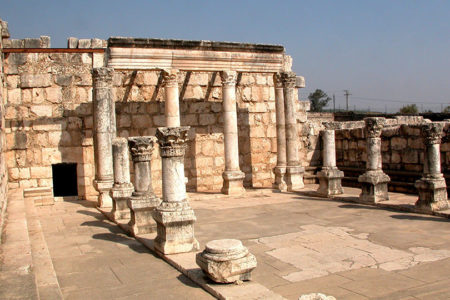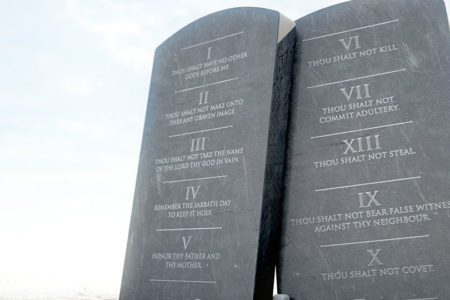The Complacent Church Revelation 3:14–22
The city of Laodicea was located in a fertile valley overlooking the Lycus River about 40 miles southeast of Philadelphia and 11 miles from Colosse. Laodicea was established by Antiochus II (264–261 B.C.). Named in honor of his wife Laodice, it was destined to become the capital of ancient Phrygia.
Its strategic location on a major trade route running from Ephesus to Syria enabled Laodicea to accumulate great wealth. The area was a well-known banking and money changing center that even minted its own coins. The manufacture of expensive cloth made from a glossy black wool added to the city’s wealth. Its medical school became famous for the development of an eye salve made from Phrygia powder (collyrium) that was used in the treatment of eye diseases worldwide. Laodicea was so wealthy that when a massive earthquake destroyed the city in AD 60, it refused aid from Rome and rebuilt at its own expense.
Antiochus the Great (III) settled 2,000 Jewish families in Phrygia and Lydia after deporting them from Babylon. Although they were forbidden to send money to Jerusalem, the city magistrates did allow Jews the freedom of worship.1
Scripture gives no indication of when or how the church was established. Most believe it was started by Epaphras (Col. 1:7; 4:12–13). Although Paul gave no evidence of visiting Laodicea, he was aware of their spiritual struggles (2:1) and sent greetings to the church (4:15). He also requested that the Colossian epistle be read in the church at Laodicea (4:16).
Christ Presented
Christ used three appositions to describe Himself to the Laodicean church. First, He called Himself “the Amen” (Rev. 3:14). Amen comes from a Hebrew root word that means certainty or truth. It is often translated “so let it be” or “truly.” Isaiah spoke of God as “the God of truth [lit., Amen]” (Isa. 65:16) or the one who will keep and bring His covenant promises to pass. This title confirms Christ’s absolute verity. He is “the truth” (Jn. 14:6) and the divine standard by which all truth is measured. Therefore, what He says about this church and all churches is absolutely trustworthy and reliable (cp. 2 Cor. 1:20).
Second, He is “the faithful and true witness” (v. 14). Christ was faithful during His wilderness temptation (Mt. 4:1–11); in witnessing the truth to people of His day; and in enduring suffering and death on the cross (Phil. 2:8). Christ’s comments to this church about their spiritual condition were not diluted, distorted, or double-tongued. His diagnosis was correct.
Third, He is “the beginning of the creation of God” (v. 14). There is no hint in this statement, as some maintain, that Christ was the first creature created by God, for He is the eternal Lord. The word beginning refers to Christ’s being the source of all creation (cf. 21:6). Christ is the creator and owner of all things, a truth that was well established in Paul’s letter to the Colossians (1:15–17) a sober reminder to a church that neglected to give God credit for their prosperity while boasting of their wealth (v. 17).
Christ’s Pronouncement
The Lord had no commendation for the Laodician church but severely censured and condemned its spiritual condition. Christ said, “I know thy works, that thou art neither cold nor hot; I would thou wert cold or hot” (v. 15). The Lord found some good works in each of the other churches mentioned in Revelation, but not one good work in this church.
It was not cold, referring to people lacking salvation, untouched and unresponsive toward spiritual things. Nor were they hot (boiling), referring to true believers who had received Jesus as Savior and showed spiritual fervor in their Christian service. Christ described them as “lukewarm” (v. 16).
What does it mean to be lukewarm? The word described the water supply of Laodicea. Because the city lacked an adequate supply of good water, it had to be piped through a system of aqueducts from the cool springs of Colosse and the hot springs of Hierapolis. By the time the water reached Laodicea it was lukewarm, tepid to the taste, and unfit to drink. Spiritually speaking, a lukewarm person is tepid, lacking in enthusiasm, halfhearted about what he or she believes. A lukewarm person may possess some sense of duty to the church but lacks true conviction and commitment.
Is a lukewarm person a believer? Some hold that the word refers to carnal believers who were once fervent in their commitment and witness for Christ but, because of sin and worldly influence, had become less feeling in their love and service for the Lord. Others believe that the word refers to people who are not believers (cold) but who profess faith in Christ (warm) but do not possess true salvation. Still others believe that lukewarm people are both of the above. Christ’s words, along with the tenor of this passage, seem to teach that lukewarm people are not believers. Such people come to church, enjoy the worship and fellow ship because they fill a need in their lives, but remain unregenerate. A lukewarm church is obnoxious and nauseating to Christ. He will “spew” it out of His mouth (v. 16), symbolic of rejection or being cut off by God (cp. Mt. 7:21–23).
The Lord revealed that wealth and worldliness had lulled this church into an attitude of self-sufficiency and self-satisfaction, producing a spirit of smug complacency. The church believed itself to be “rich, and increased with goods, and hav[ing] need of nothing” (v. 17). Such self-confidence showed a lack of true spiritual perception, which led this church to self-deception concerning its spiritual condition. In today’s terminology, this church possessed a magnificent facility in which to worship, state-of-the-art equipment for ministry, a well-clothed and polished congregation that prided itself in a highly paid pastoral staff, and was wealthy enough to meet all their needs and wants.
Christ revealed the true spiritual condition of this church as wanting. He saw them as “wretched” (v. 17); that is, oppressed with a burden. Wealth can become a burden to those who possess it. Paul warned that wealth can bring a snare and sorrow, not satisfaction (1 Tim. 6:9). Jesus said, “Ye cannot serve God and money” (Mt. 6:24). He saw this church as “miserable” (pitiful, v. 17). A complacent church is a pitiful sight within any community. He saw the church as “poor” (beggarly, v. 17). The church, although wealthy in financial and material gain, was spiritually bankrupt. What a contrast to the church at Smyrna who, for Christ’s sake, was poor in this world’s goods but rich spiritually. He saw the church as “blind” (nearsighted, v. 17). Wealth and materialism can blind the mind, leaving people self-deceived concerning their true spiritual condition—an irony for a city noted worldwide for producing the best remedy for treating eye diseases. He saw the church as “naked” (v. 17). Although they produced costly garments for others, they were spiritually naked, not clothed in the white garments of righteousness. Their spiritual poverty, blindness, and nakedness made them wretched and miserable. It is possible to have much of this world’s good and yet be miserable.
Christ’s Proposal
Christ counseled this church in three ways. First, He told them to acquire spiritual riches: “buy of me gold tried in the fire, that thou mayest be rich” (v. 18). True riches are found in Christ, not in material wealth. The church needed to acquire true faith by receiving the Lord. Gold is an emblem of faith; those who possess it acquire true spiritual riches resulting in lives that glorify and honor the Lord. It must be noted that salvation cannot be purchased. To buy means to acquire the priceless treasure of salvation through faith in Christ (cp. Isa. 55:1). Second, they needed to be clothed in “white raiment” in order that their “nakedness” might be covered (v. 18). White raiment speaks of Christ’s holiness and righteousness, which clothes all true believers making them acceptable in God’s sight. Third, the church needed its spiritual sight restored by anointing its “eyes with salve” (v. 18). Unsaved people are spiritually blind. They must have their spiritual blindness healed with the salve of salvation applied by Christ so that they can see to walk properly before Him. Christ rebuked and chastened the lukewarm church because of His love for it (v. 19). The purpose for His chastening was to bring them to repentance. He commanded them to “be zealous … and repent” (v. 19). He wanted them to be convicted of their ways and show an enthusiastic desire to repent.
Christ’s Presence
From the church that had shut Him out Christ requested permission to enter: “Behold I stand at the door, and knock; if any man hear my voice, and open the door, I will come in to him” (v. 20). There was still time for professing Christians to receive Christ. The point is clear: When the Lord calls a church to fervent commitment, He does so by dealing with individuals. Often the dedication of one person filled with enthusiasm for the Lord will spark revival within a church.
At Keble College in Oxford, England, there hangs a portrait of Christ entitled “The Light of the World.” The painting was rendered by William Holman Hunt in 1854. Christ is pictured knocking at a door with a lantern in His hand and His hair wet with the dew of the night, anticipating that someone will answer the door. Upon finishing the painting, Hunt invited his friends to view his work. Immediately it was noticed that Hunt had forgotten to put a handle on the outside of the door. Confronted by the obvious error, Hunt replied, “True, if this were an ordinary door; but this is not an ordinary door, it is a picture of the sinner’s heart and Christ is knocking, seeking admission. The handle is on the inside, for Christ cannot enter the human heart unless it is opened from the inside.” Christ does not force His way or will upon the life of any individual or church. Rather, he knocks, waiting to be invited in for fellowship. The portrayal of Christ outside the door of His own church seeking entrance seems unbelievable, but it is true.
A person who opens the door of his or her heart will experience rich spiritual blessings from the Savior: “I will come in to him, and will sup with him, and he with me” (v. 20). Notice the contrast: The one who refused His invitation is vomited out, but the one who voluntarily received His invitation will enjoy supping with Him. The time of supping mentioned here is the main meal of the day, when families gather for intimate fellowship with close friends.2 People who have invited Christ into their lives will enjoy intimate fellowship with Him. They will feast on the spiritual food that only the Lord is able to supply.
Christ’s Promise
To the conqueror Christ promised, “To him that overcometh will I grant to sit with me in my throne, even as I also overcame, and am set down with my Father in his throne” (v. 21). Overcoming believers will share the throne of their overcomer, the Lord Jesus Christ.3 Jesus overcame the world through suffering and death (Jn. 16:33) and is now seated at the right hand of God the Father (Mk. 16:19). A joint reign with Christ is mentioned a number of times throughout Revelation (1:6, 9; 2:26–27; 5:10; 20:4–6). Christ has promised His disciples that they will eat and drink at His table in the Kingdom. All believers are joint heirs with Christ (Rom. 8:17). During the Millennium, Christ will establish His throne on the earth (Mt. 25:31; Lk. 1:32), and all believers will reign with Him for a thousand years (Rev. 20:6). Can there be any greater reward than this?
Once again the Lord concluded His message with a command for the church to listen: “He that hath an ear, let him hear what the Spirit saith unto the churches” (v. 22). Although grace has its limits, the day of grace has not ended; there is still time for lukewarm people to invite Christ into their hearts.
Do you hear Christ knocking at the door of your heart? In her hymn “Let Jesus Come into Your Heart,” Mrs. Lelia Morris penned an appropriate response to those who are tired of the load of their sin and desire a new life to begin. She wrote,
Just now, your doubtings give o’er;
Just now, reject Him no more;
Just now, throw open the door;
Let Jesus come into your heart.
ENDNOTES
- William White, Jr., The Zondervan Pictorial Encyclopedia of the Bible, Laodicea (Grand Rapids: Zondervan Publishing House, 1976), Vol. III, p. 877.
- Alan F. Johnson, The Expositor’s Bible Commentary, Revelation (Grand Rapids: Zondervan Publishing House, 1981), Vol. XII, p. 459.
- Walter M. Dunnett, Lord of the Churches, Moody Manna (Chicago: Moody Press, 1966), Part II, p. 30.








